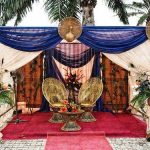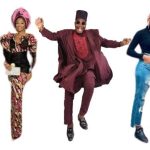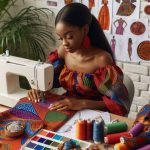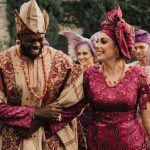Fashion is an essential part of Nigerian culture, a land with over 250 ethnic groups, each with its own distinct fashion traditions. Over the years, Nigeria has evolved into one of Africa’s most prominent fashion hubs. From the runway to the streets, fashion is everywhere in Nigeria, and it is a reflection of the country’s diversity, creativity, and rich heritage.
In recent years, Nigerian fashion influencers have made waves in the global fashion industry. With their unique blend of cultural traditions and modern trends, these influencers have risen to global prominence, amassing large followings on social media platforms such as Instagram, YouTube, and TikTok. They are not just tastemakers in Nigeria but have become an inspiration to fashion enthusiasts worldwide.
This post delves into the rise of Nigerian fashion influencers, explores their style secrets, and reveals how they are influencing the global fashion scene.
The History and Evolution of Nigerian Fashion
To appreciate the role of Nigerian fashion influencers today, it’s important to look at the historical evolution of Nigerian fashion. Traditional Nigerian fashion is rooted in the distinct cultural practices of the country’s various ethnic groups, each with its own fabrics, patterns, and accessories.
Traditional Fashion in Nigeria
- Yoruba Attire: The Yoruba people, one of Nigeria’s largest ethnic groups, are known for their luxurious fabrics like Aso-Oke and Adire. Yoruba men often wear Agbada (a wide-sleeved robe) and Buba with matching caps (Fila), while women wear Iro (wrapper), Buba (blouse), and Gele (headwrap).
- Igbo Fashion: Igbo men traditionally wear Isiagu (a richly embroidered top), often paired with trousers, while women wear George wrappers and blouses. Igbo culture emphasizes the use of coral beads and other accessories that symbolize wealth and status.
- Hausa-Fulani Style: The Hausa-Fulani people in northern Nigeria have their own traditional attire known as Babban Riga for men, and Zani (wrapper) paired with Blouse for women. The region’s fashion is typically more conservative due to religious influences, with the Hijab and Kaftan being common.
- Afrobeat and Ankara Renaissance: In the mid-20th century, cultural icons such as Fela Kuti brought traditional Nigerian styles into the limelight, blending fashion with the Afrobeat movement. The resurgence of Ankara (a colorful African wax print) in the 2000s signaled a return to African-inspired clothing, sparking interest from both local and international fashion designers.
The Digital Age and the Rise of Nigerian Fashion Influencers
The advent of social media revolutionized the fashion world. Before social media, fashion trends were largely dictated by fashion houses and traditional media outlets. Today, fashion influencers – people who have the power to shape and dictate trends via their large social media followings – are the new style authorities.
Nigeria has one of the largest populations of internet users in Africa, and this internet-savvy generation has embraced social media platforms as a way to express their creativity, lifestyle, and, of course, fashion. Nigerian fashion influencers use platforms like Instagram, YouTube, and TikTok to connect with their audience, promote local designers, and push African fashion to the forefront of global style.
These influencers often collaborate with fashion brands and designers, bringing attention to Nigerian fashion houses like Deola Sagoe, Maki Oh, and Lisa Folawiyo. Their global reach has made them vital players in expanding Nigeria’s fashion industry beyond Africa.
The Role of Social Media in Shaping Nigerian Fashion
Social media has played an essential role in the growth of Nigerian fashion influencers. Platforms like Instagram and YouTube allow influencers to share their outfits, fashion tips, and even behind-the-scenes glimpses of their collaborations with designers.
1. Instagram’s Impact on Fashion
With over 1 billion monthly active users, Instagram is the most influential social media platform in fashion today. Nigerian influencers use Instagram as their primary platform to showcase their outfits, engage with fans, and promote brands. The visual nature of Instagram makes it perfect for fashion influencers to exhibit the vibrant and diverse fashion landscape of Nigeria.
2. YouTube
From Tutorials to Style Inspiration: YouTube allows Nigerian fashion influencers to create more in-depth content, such as tutorials on styling traditional fabrics or beauty tips. Channels like those of Dimma Umeh and Patricia Bright (who has Nigerian roots) have become massive, giving followers long-form content on fashion, skincare, and lifestyle.
3. TikTok’s Fashion Boom
TikTok has revolutionized short-form content, and Nigerian fashion influencers have not been left out. With the platform’s ability to trend fashion challenges and style hacks, influencers in Nigeria have tapped into TikTok to reach younger audiences, further increasing their global appeal.
Influential Nigerian Fashion Icons and Their Style Secrets
In the world of Nigerian fashion, several influencers have distinguished themselves with their signature styles and innovative fashion choices. Here’s a deeper look at some of the top fashion influencers and how they continue to shape trends, both locally and globally.
1. Toke Makinwa: The Queen of Glamour
Toke Makinwa is a media personality, best-selling author, and fashion influencer whose style is synonymous with glamour. Toke’s ability to balance luxury with everyday fashion has made her a household name in Nigeria. Her red carpet appearances, glamorous events, and street style always inspire admiration.
Style Secrets:
Luxury Wardrobe: Toke invests in designer clothing and accessories but knows how to pair them with high-street fashion, creating a balanced and accessible look.
Monochromatic Looks: Toke favors monochromatic outfits, often experimenting with bold colors like red, blue, and yellow to create eye-catching ensembles.
Statement Pieces: Whether it’s a designer handbag or a pair of statement shoes, Toke always has one standout piece in her look that elevates her outfit.
2. Temi Otedola: The Minimalist Muse
Temi Otedola is the daughter of Nigerian billionaire Femi Otedola and one of the most influential voices in fashion through her blog, JTO Fashion. Known for her minimalist approach, Temi’s style is all about simplicity and elegance.
Style Secrets:
Timeless Basics: Temi invests in high-quality basics like tailored trousers, blazers, and classic white shirts. These versatile pieces can be styled in various ways to create a sophisticated, minimalist look.
Neutral Palette: She is known for sticking to neutral colors such as white, black, and beige. This understated palette makes her style timeless and versatile.
Quality Over Quantity: Temi emphasizes quality over quantity, often choosing investment pieces that will last for years instead of following fast fashion trends.
3. Denola Grey: The Pioneer of Nigerian Men’s Fashion
Denola Grey is not just one of the leading male fashion influencers in Nigeria; he’s also a fashion icon across Africa. Known for his impeccable sense of style, Denola’s looks often include a mix of classic tailoring and contemporary trends.
Style Secrets:
Tailored Perfection: Denola places a strong emphasis on fit. Whether it’s a classic suit or a casual outfit, his clothes are always perfectly tailored to his body.
Bold Accessories: Denola is unafraid to experiment with accessories like brooches, pocket squares, and statement rings, adding a touch of personality to every outfit.
Pattern Mixing: From floral prints to stripes, Denola is a master of mixing and matching patterns without clashing.
4. Nancy Isime: The Fashion Chameleon
Nancy Isime is an actress and television presenter known for her ability to switch effortlessly between casual streetwear and high-end fashion. Nancy’s versatility in fashion has made her a trendsetter in Nigerian fashion circles.
Style Secrets:
Diverse Aesthetic: Nancy’s style ranges from athleisure to couture, making her unpredictable and exciting to watch. She doesn’t shy away from experimenting with different styles, which keeps her followers engaged.
Bold Hair Choices: Known for her platinum blonde look, Nancy’s hair is always a statement. Whether it’s short, braided, or in a dramatic updo, her hair complements her overall aesthetic.
Power Dressing: Nancy loves a good power suit. She often opts for well-tailored suits that highlight her strong, feminine presence.
5. Stephanie Coker: The Afrocentric Queen
Stephanie Coker is another Nigerian influencer known for embracing African culture in her style. She consistently incorporates traditional Nigerian fabrics and accessories into her wardrobe, pushing Afrocentric fashion into the spotlight.
Style Secrets:
Fusion of Traditional and Modern: Stephanie frequently mixes traditional African fabrics like Ankara with modern silhouettes, creating a unique Afrocentric style.
Headwraps and Accessories: She is known for her use of African accessories, especially headwraps, which add an authentic cultural touch to her outfits.
Vibrant Colors: Like many Nigerian influencers, Stephanie loves to experiment with bold, vibrant colors, reflecting the rich cultural heritage of Nigeria.
6. Eki Ogunbor: The Sustainable Fashion Advocate
Eki Ogunbor is known for her commitment to promoting sustainable fashion in Nigeria. As an editor at Bella Naija Style, she uses her platform to promote ethical fashion and support local Nigerian designers who embrace sustainability. Eki’s influence goes beyond just fashion choices; she is passionate about creating awareness around the environmental and social impacts of the fashion industry.
Style Secrets:
Sustainability First: Eki advocates for conscious fashion choices. Her wardrobe features clothing from ethical brands that prioritize fair trade, sustainable fabrics, and minimal environmental impact. She encourages her followers to buy less but choose better, favoring timeless pieces over fast fashion.
Recycling and Upcycling: Eki often wears pieces in multiple ways to demonstrate how one can get more wear out of a single item. She also supports upcycling, giving old clothes a fresh twist with new styling techniques or minor alterations.
Celebrating Nigerian Designers: Eki makes it a point to spotlight Nigerian and African designers who are committed to sustainable practices. This not only supports local businesses but also showcases the creativity and craftsmanship within Nigeria’s fashion industry.
The Global Impact of Nigerian Fashion Influencers
The influence of Nigerian fashion influencers extends far beyond the borders of Nigeria. Their distinctive styles, cultural pride, and ability to blend tradition with modernity have garnered global attention from major fashion houses, designers, and international audiences.
1. Nigerian Fashion on the Global Runway
One of the most significant impacts of Nigerian fashion influencers has been their ability to take Nigerian fashion to the global runway. Nigerian designers like Maki Oh and Lisa Folawiyo have showcased their collections at international fashion weeks, and it’s not uncommon to see influencers like Toke Makinwa and Temi Otedola front row at these events, wearing traditional Nigerian prints with a modern twist.
In recent years, African-inspired prints, especially Ankara, have become increasingly popular in Western fashion. From Beyoncé to Rihanna, celebrities have been seen donning African-inspired outfits, showing the influence of Nigerian fashion beyond the continent. Fashion brands like Stella McCartney and Louis Vuitton have incorporated African fabrics and designs into their collections, further highlighting how Nigerian fashion has become a source of inspiration globally.
2. The Influence of Afrobeat Culture on Fashion
The global rise of Afrobeat music, championed by artists like Burna Boy, Wizkid, and Davido, has had a profound effect on the fashion industry. Afrobeat stars are often seen in bold, fashion-forward outfits that blend street style with traditional African elements, and their influence is spreading worldwide. Fashion influencers in Nigeria, who often have close ties to the music industry, are helping to shape the visual identity of Afrobeat culture through their fashion choices.
The symbiotic relationship between music and fashion has only amplified the reach of Nigerian fashion influencers. From music videos to global tours, Nigerian fashion is being exposed to new audiences, creating a demand for the styles and aesthetics that influencers are promoting.
3. Collaborations with International Brands
Nigerian influencers are increasingly collaborating with global fashion brands. These collaborations have helped amplify the voices of Nigerian influencers on the world stage and brought African fashion into the spotlight. For example, Temi Otedola has worked with major luxury brands like Bulgari, while Toke Makinwa has partnered with global beauty brands like MAC Cosmetics.
These partnerships signal the growing recognition of the power of Nigerian fashion influencers, as brands are eager to tap into their influence, authenticity, and unique perspectives. With Africa being one of the fastest-growing regions for fashion and luxury, international brands see Nigerian influencers as key to connecting with African consumers while expanding their reach globally.
4. Redefining Beauty and Fashion Standards
Perhaps one of the most significant contributions Nigerian fashion influencers have made is in redefining beauty and fashion standards. The global fashion industry has traditionally been dominated by Western ideals of beauty, which often excluded diverse skin tones, body shapes, and cultural expressions. However, Nigerian influencers have been instrumental in challenging these norms and promoting inclusivity.
By celebrating their natural features, such as dark skin, afro-textured hair, and curvier body types, Nigerian influencers are helping to reshape the global conversation around beauty. This has contributed to a broader acceptance of diverse standards of beauty, and global brands are increasingly featuring models and influencers from Africa in their campaigns.
Nigerian fashion influencers have also embraced and popularized African hairstyles, such as braids, cornrows, and afros, challenging the Western beauty standards that often disregarded these styles. Their unapologetic embrace of their heritage has resonated with audiences worldwide, creating a shift in how African beauty is perceived on the global stage.
The Future of Nigerian Fashion Influencers
The future is bright for Nigerian fashion influencers as they continue to break boundaries and redefine what it means to be fashionable in today’s world. The global fashion industry is paying closer attention to African fashion, and Nigerian influencers are leading the charge in ensuring that Africa’s rich cultural heritage is not only preserved but also celebrated on a global scale.
As sustainability becomes a growing concern in the fashion industry, Nigerian influencers like Eki Ogunbor will likely play a critical role in advocating for eco-conscious fashion practices. More influencers are expected to collaborate with local designers, promoting homegrown talent and fostering the growth of Nigeria’s fashion industry.
Additionally, with social media continually evolving, Nigerian influencers will find new ways to engage with their audiences. Platforms like TikTok are already proving to be a game-changer, allowing influencers to reach younger, more global audiences with short-form, viral content.
Moreover, Nigerian fashion influencers will continue to influence global fashion trends, not just through their bold fashion choices but through their ability to tell compelling stories. Nigerian fashion is not just about clothes; it’s about culture, identity, and pride. As more people across the world become interested in African fashion, Nigerian influencers will be there to lead the conversation and push the boundaries of global fashion.
Conclusion
Nigerian fashion influencers are a testament to the power of creativity, cultural pride, and innovation. They are not just followers of trends but trendsetters in their own right, bringing Nigerian fashion and culture to the global stage. Their ability to mix traditional fabrics with contemporary fashion, embrace sustainability, and redefine beauty standards has made them key players in the global fashion industry.
As the world continues to look to Nigeria for fashion inspiration, these influencers will undoubtedly continue to shape the future of global style. With their unique blend of tradition, modernity, and creativity, Nigerian fashion influencers have proven that they are here to stay, and their influence will only continue to grow.







Leave a Reply